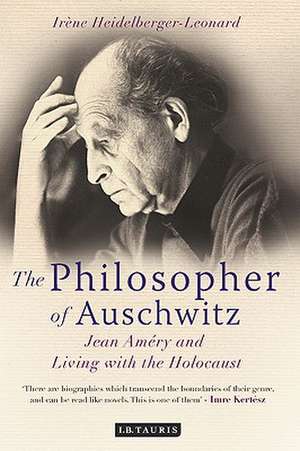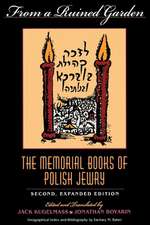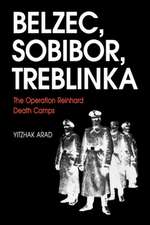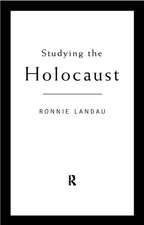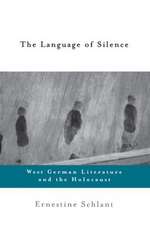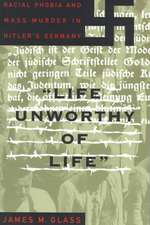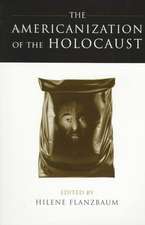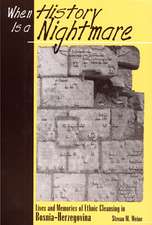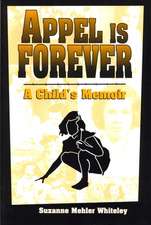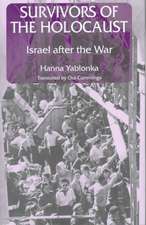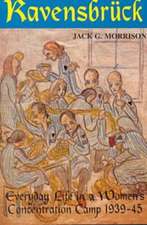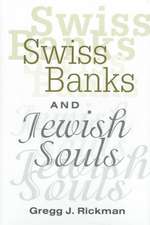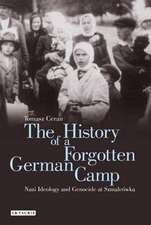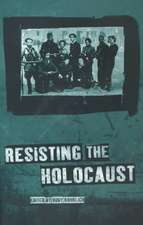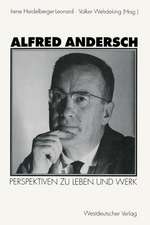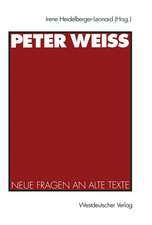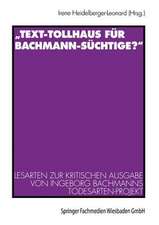The Philosopher of Auschwitz: Jean Améry and Living with the Holocaust
Autor Irène Heidelberger-Leonard Traducere de Anthea Bellen Limba Engleză Hardback – 29 iul 2010
Preț: 324.50 lei
Preț vechi: 372.32 lei
-13% Nou
Puncte Express: 487
Preț estimativ în valută:
62.09€ • 65.00$ • 51.38£
62.09€ • 65.00$ • 51.38£
Carte tipărită la comandă
Livrare economică 05-19 aprilie
Preluare comenzi: 021 569.72.76
Specificații
ISBN-13: 9781848851504
ISBN-10: 1848851502
Pagini: 316
Ilustrații: 50 integrated b/w
Dimensiuni: 156 x 234 x 30 mm
Greutate: 0.64 kg
Ediția:New.
Editura: Bloomsbury Publishing
Colecția I.B.Tauris
Locul publicării:London, United Kingdom
ISBN-10: 1848851502
Pagini: 316
Ilustrații: 50 integrated b/w
Dimensiuni: 156 x 234 x 30 mm
Greutate: 0.64 kg
Ediția:New.
Editura: Bloomsbury Publishing
Colecția I.B.Tauris
Locul publicării:London, United Kingdom
Notă biografică
Irene Heidelberger-Leonard is Professor of German Literature at the Free University of Brussels. She has written extensively on the German post-war period and its relationship to National Socialism and is the editor of a nine-volume edition of Amery's writings. Her biography of Jean Amery was named as non-fiction Book of the Year by the German Cultural Foundation in 2004 and was awarded the prestigious biennial Einhard Prize for Outstanding European Biography 2005.
Cuprins
1. VILLAGE IDYLL (1912-1924) - Bad Ischl and the Magic of the ForestHohenems: certificate of citizenship and ostensible homeland . The family . Early years in Vienna . Hans and Ernst Mayer: friends in life and death . Bad Ischl . Who or what is a Jew? . A divided heart . Winter world versus summer world . The tribulations of the young grammar-school boy2. ZIRKUSGASSE 48 (1924-1935) - The Enticements of ReasonLeopold Langhammer, Mayer's mentor . Red Vienna . First encounters: Broch, Canetti, and the Austrian literary scene . Hans Mayer's personal revolution . Approaches to the Wiener Kreis [Vienna Circle] . The future writer . Die Brücke3. HANS MAYER AS A WRITER OF FICTION - Die Schiffbrüchigen [The Shipwrecked], 1935/451935 Préludes . The first novel . Autobiography as historical writing . Althager - an alter ego? . The relationship to 'the other' . Genophobia . 'Art should not describe life, but create life' . 1945: To be or not to be . Auschwitz - a mass fate? . The Auschwitz discourse then and now4. YEARS OF WANDERING (1938-1945) - The Mind Knows no LimitsVienna before and after the Anschluss . Antwerp (1939-1940) . St. Cyprien - Gurs (1940-1941) . Flight to occupied Belgium . Resistance in Brussels . Breendonck (1943) . Torture in his novel (1945) . Torture in the essay (12965) . Auschwitz - Dora-Mittelbau - Bergen Belsen (1944-1945) . Jean Améry / Primo Levi - an excursus . Friends strange to each other . Coming home to no home5. LIVING ON - BUT HOW AND WHERE? (1945-1955) - The principle of educationThe original theme of suicide: Love's Crown of Thorns: variation 1 . Heinrich Greyt: variation 2 . Die Selbstmörder: variation 3 . Kleist: variation 4 . Die Eingemauerten [The Immured]: variation 5 . Existentialism in France. Revolution of the mind? Fashion? Or the twilight of the 'esprit français'? . 'On the Psychology of the German People': revenge? . Neither guilt nor atonement . Deranged criminals . Work will not make you free . Letter of farewell to Knut Hamsun . Where now? His fixed point: Maria Leitner . Vienna? Bad Ischl? The 'indissoluble boyhood friendship' . Cologne? Comrade Heinz Kühn . Dangerous games with identity . Lore's London? ' Sartre's Paris? . Zürich and the Dukas press agency? . Brussels old and new . The Adelboden sanatorium . Journalistic confectionery 6. JEAN AMÉRY THE JOURNALIST (1955-1965) - All Active on the Western FrontPortraits of famous contemporaries . Vive la science! . Jazz - heightened emotion . Stars of the fifties . Revelations . Gerhart Hauptmann, especially the negative aspects . Preface to the Future . Inventory . Alternative memory . The 'engine' of a culture? . France's cultural mission to the world . Jean-Paul Sartre - First excursus . Sartre - writer of the Resistance . Sartre - the teacher of life . Sartre - the teacher of thinking . The first idea for Charles Bovary . Sartre - the mouthpiece of the wartime generation . 'Le faux, c'est la mort' . 'The God that failed' . America's political sense of mission . In the name of the Cold War . The abolition of death, the glorification of sex . America's cultural contribution: sociology . England between Europe and America? . England's not so splendid isolation . Germany - an upswing through anaesthetization . First visit: Hitler never existed . Germany 1945, Germany 1952 . A cultural miracle? . No revocation of history . German thinkers after 1945 . German writers after 1945 . A break with emigration . No pact between reader and author . Hope and the second generation 7. DRAMA OF THE MIND IN THREE ACTS - the autobiographical trilogyPrologue . Heissenbüttel and the consequences . Who brings whom to the meeting?. If not now, when? . The Auschwitz trial . A star is born . Act I: At the Mind's Limits (1966): Auschwitz and the Intellectual . The single useful starting point: the 'I' . Less than welcome approval . At the body's limits . Welcome approval . Merkur to the end . Adorno - friend or f
